Bryan Habana’s face is usually one enormous, irrepressible smile. But for a moment he grimaces. He is recalling the pain barrier he went through playing sevens. He is also doing some quick arithmetic.
“I was a sprinter of short distances – 100m and 200m – but I reckon sevens is the equivalent of running seven 400m at full pace in seven minutes,” he says, talking from the comfort of a box in the Hong Kong Stadium. Michael Hooper, on debut for Australia, is milling about somewhere on the turf behind him, and about to discover for himself the truth or otherwise of Habana’s words. “It’s absolutely brutal. And it’s not just about being a speed demon. The breakdowns are… I want to say atrocious. You need to continually go into a red zone. It’s as tough as it gets.”
It’s enough to make you exhausted just by listening to him. But Habana’s not done. “Then there’s the intensity of the warm-up – trying to get a heart rate of 190 close to 200 three times a day before you actually go into a three-day tournament…”
Habana, the most lethal finisher of his generation at XVs, tried to convert to the sevens format ahead of the 2016 Olympics. He didn’t make the cut for the Rio Games.
The memories of trying to switch formats are still vivid. And he knows better than anyone success at XVs is no passport to success at sevens. It is a salutary tale for anyone, should they exist, who is tempted to believe that the seven-player format is in some way inferior.
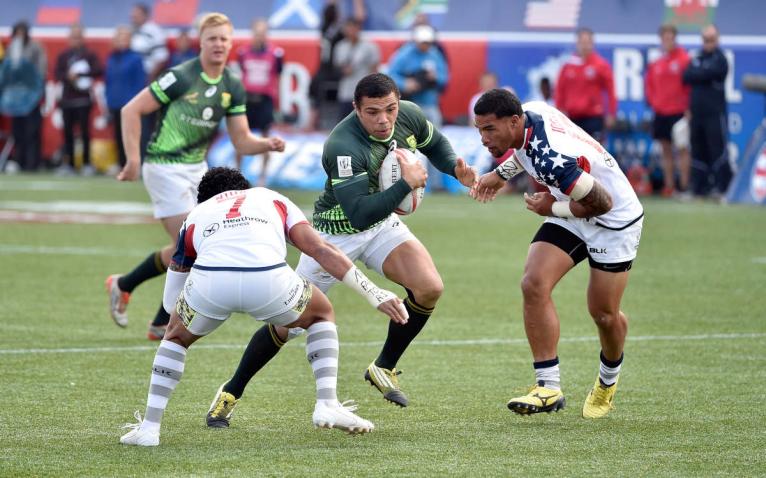
“I’ll never forget in 2016, I’d had a game for Toulon against Brive and I flew to the Stellenbosch Academy of Sport,” recalls Habana, allowing a wry smile to break through. “After that first training session I was absolutely blowing and I looked up to the sky and was in the deepest of darkest moments thinking to myself ‘What the hell have you got yourself into at 32 years old?’”
In the aftermath of his debut in the SVNS Series in Hong Kong, it is possible that Michael Hooper – aged 32, in case you were wondering – is asking himself similarly probing questions. He too is attempting to make the transition following a decorated career in XVs and has the Olympics as his target.
By his own admission, Hooper’s opening foray into Sevens went past in a blur. Among the rugby cognoscenti, the general perception is Hooper has considerable work to do on his positional awareness, but his work at the breakdown was typically potent.
But amid all the change of adapting to the seven-man code, some things stayed the same: defeat to New Zealand. Having spent years in XVs as the patron saint of lost causes against the All Blacks, Hooper discovered his trans-Tasman rivals were there to stymie him in sevens too. Australia went down 26-7 in the semi-finals. The more things change the more they stay the same.
Hooper has all the hallmarks of someone who has the capacity to transfer the skills from 15s across to Sevens: huge engine, fitness, great hands, acceleration, brilliant chop-tackler, very good at the ruck.
Bryan Habana
Not that things are staying the same for Hooper in terms of his training regime. He continues to recondition has body to make it nimbler and faster for sevens, while also rewiring his brain to ensure he does not find himself getting isolated in the short-format game, as he explains in this sit-down interview with SVNS sponsors HSBC.
Alongside Habana, another legend of the XVs game is keeping an eagle-eye on Hooper’s progress, not least with the Paris Olympics just around the corner. Brian O’Driscoll sees an abundance of potential in Hooper, but says there are no guarantees or gimmes in the world of sevens.
“Nothing is gained on a previous reputation and Michael would probably be the first to say you’ve got to earn your spot,” says O’Driscoll, who like Habana is a global brand ambassador for HSBC. “He’s got to deliver on a new stage. No doubt, he has all the hallmarks of someone who has the capacity to transfer the skills from XVs across to sevens: huge engine, fitness, great hands, acceleration, brilliant chop-tackler, very good at the ruck – all those components are really important in sevens. I think we’d all be surprised if there wasn’t a natural inclination to him being a very natural sevens player. But he needs to prove it.
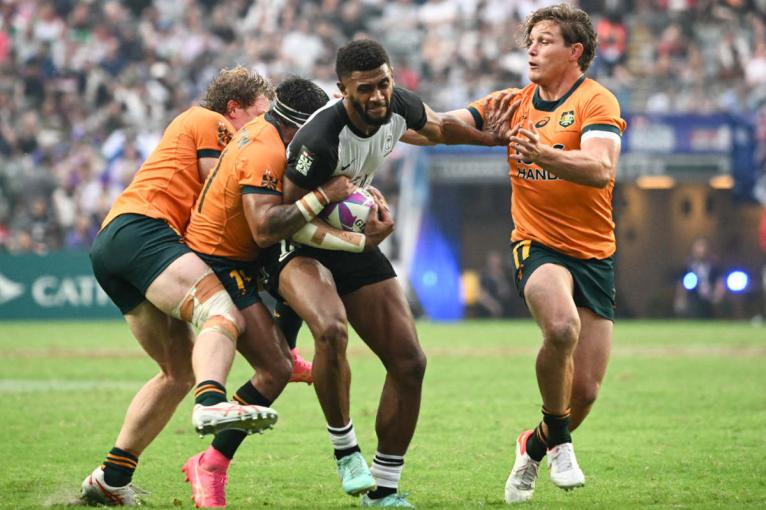
“Just because you’ve been a brilliant XVs player there’s no automatic progression in getting into that pretty impressive Aussie team which has been relatively successful over the course of the last couple of years. They’ve shown some really good signs to be confident going into the Olympics.”
One man who can be pretty confident of going to the Olympics but who was missing from Hong Kong was a certain Antoine Dupont.
While Hooper was making his first bow on the SVNS Series, Dupont was back in France guiding Toulouse to a European Champions Cup victory over Racing 92.
Having missed the Six Nations in order to have his first mightily impressive crack at sevens, Les Bleus’ scrum-half is now yo-yo-ing between club and country. An infinitesimally small number of players, you feel, would be given such liberty to swing between the two. But then, as we all know, Dupont is no rank-and-file player. Rather, he is rapidly on his way to becoming the Napoleon of cross-format generalship and skill.
XVs’ loss is definitely Sevens’ gain with Dupont. We don’t know what a ceiling looks like for him yet because he continues to break through it.
With Dupont on the teamsheet, France won their first SVNS cup final in almost two decades in Los Angeles in March and he impressed on debut in Vancouver too. Even without the maestro, France were runners up in Hong Kong. France are a side on form. Chuck in the full-throated support of a home crowd in Paris and they will be a side no-one will want to face at the Games.
For all of Dupont’s other-worldly skillset and his apparent rapid adaptation to sevens, O’Driscoll cautions against France allowing him too much time back at his club.
“You’d love to be able to crystal-ball back to before the World Cup to see if this [Dupont playing sevens] was always the plan, or whether it was a reaction to the disappointment of what happened back in Paris against South Africa,” says O’Driscoll. “But whichever it is, XVs’ loss is definitely Sevens’ gain with Dupont. We don’t know what a ceiling looks like for him yet because he continues to break through it.
“Sometimes there are names on a team sheet that galvanise and give comfort, and when you see somebody of his magnitude beside you, you think, ok, we’ve got a real shot here.
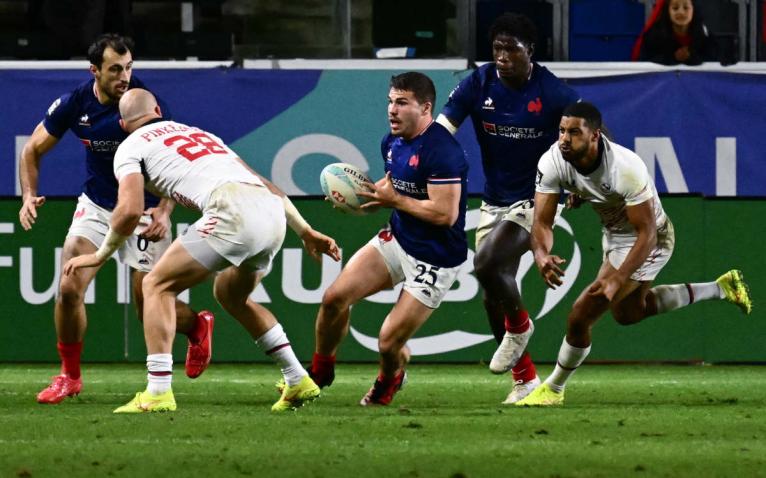
“It was a bit of surprise they didn’t put him into Hong Kong and that he’s gone back to XVs for now. He is human and still needs some game time to be given the capacity to learn the intricacies around sevens. It’s difficult because I’m sure his paymasters in Toulouse are saying ‘we could do with you as well’. But he’s shown in his first couple of showings that he’s a footballer for whatever code. I am a bit surprised that he hasn’t committed one way or the other but the proof will be in what transpires in the summer at the Olympics.”
With rugby rock stars of Dupont and Hooper’s stature potentially appearing at the Olympics, is sevens set for a decisive breakthrough moment? Habana doesn’t think so, for the simple reason such a moment has already occurred.
“I don’t think it’s a watershed moment for XVs players coming over to Sevens,” says the former Springbok wing. “It’s been done before. I think sevens had its watershed moment when it became an Olympic sport [in Rio in 2016]. I gave it a good crack and unfortunately came up short, but even in 2016 you had Sonny Bill Williams, myself, Quade Cooper and Liam Messam – you had quite a few raising the stakes.
“The profile was raised, and it’s a fine balance you need to strike in terms of having sevens players who’ve been grinding it out for the past four-year cycle and having guys like Hoops and Dupont. It’s about the galvanisation from an external superstar not rocking the boat. But having absolute global superstars like Dupont and Hooper does raise the profile of sevens. If they can make it to the Olympics then chapeau to them.”
Hoops is a guy who I felt was dealt a very bad hand last year. He would have made a massive impact for Australian rugby at the World Cup. Hoops’ mental resilience and fortitude is something that can really galvanize an Australian Sevens side.
Bryan Habana
Habana admits he would love to see Sevens deliver a redemption story for Hooper, who was ludicrously – we might even say cruelly – dropped by Eddie Jones before what turned out to be the Wallabies’ disastrous Rugby World Cup campaign in France.
“Hoops is a guy who I felt was dealt a very bad hand last year,” says Habana. “He would have made a massive impact for Australian rugby at the World Cup. Hoops’ mental resilience and fortitude is something that can really galvanize an Australian Sevens side that is looking to push on to get some semblance of success in the build up to Paris 2024. And it would be a bit ironic if a year on Hoops is gracing the Olympic Sevens in a place where he probably should have been playing rugby in the knock-out stages of the World Cup a year earlier.
“His ability to lead from the front is something this Australian Sevens side will lap up. He’s been pretty honest about his own journey, saying he’s potentially not the fastest, not the fittest, but one thing he is going to do is give it an absolute crack. If what happened with Antoine Dupont is anything to go by, Hoops is going to go extremely well.”
Following Hong Kong, Hooper has two more destinations on the SVNS Series to hone his skills and state his case for Olympic inclusion: Singapore in early May and the grand final in Madrid from May 31-June 2.
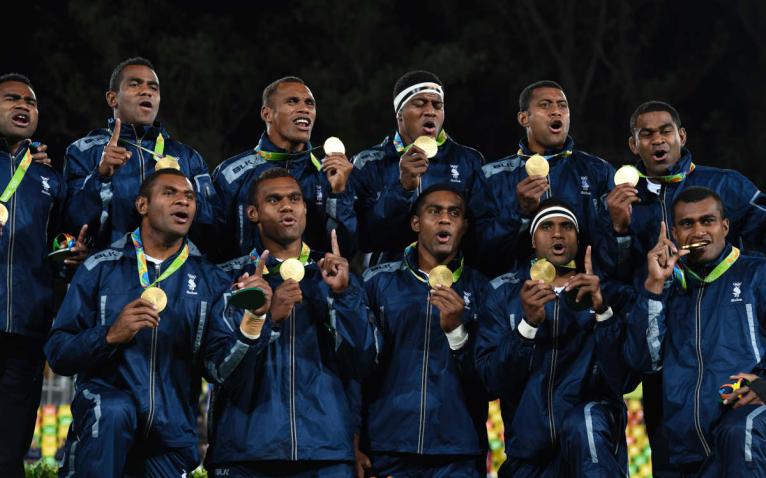
And if Hooper’s sevens journey ends with a fairytale Olympics appearance – and it is a considerable if – then O’Driscoll senses it could be one ingredient in a potential rebirth of Australian XVs. The former Ireland captain is not discounting new Wallabies coach Joe Schmidt bringing Hooper back into the fold.
“Joe is a big signing and if Hooper can go and achieve an Olympic medal of some description and feel exhilarated and enthused about possibly playing for the Wallabies again I’m sure they would welcome him with open arms. Australia’s always had some great depth in the back row and they’ve got some good quality coming through, but there’s nothing quite like experience to lean into at times.
“We were all really shocked I think, and I speak for the vast majority of people, when we saw his omission from the World Cup squad. To go from captain to not being involved at all was a real surprise. I think he’d have been involved in the vast majority of World Cup squads if coaches could select from outside their own team, which speaks volumes for the individual and the quality he has delivered year on year. And sometimes in an Australia team that’s been struggling he’s stood head and shoulders above everyone else.”
Ben Earl would be good, wouldn’t he? Wow. For me he was the standout player of the Six Nations. He’s all the skills: good acceleration, great footwork, physical, strong, could scrummage, good operator in the lineout and just has the ability to go and go and go.
Brian O’Driscoll
While Hooper’s maiden appearance on the SVNS Series made him the topic of conversation around the bars of Hong Kong, it also opened the door to a game of fantasy sevens.
RugbyPass put it to Habana and O’Driscoll: which current XVs players would you most want to see making a bolter conversion?
O’Driscoll is straight out of the traps.
“Ben Earl would be good, wouldn’t he? Wow. For me he was the standout player of the Six Nations. He’s all the skills: good acceleration, great footwork, physical, strong, could scrummage, good operator in the lineout and just has the ability to go and go and go. A big engine is the minimum standard – and a huge mental capacity to be able to dig in when others want to give up.”
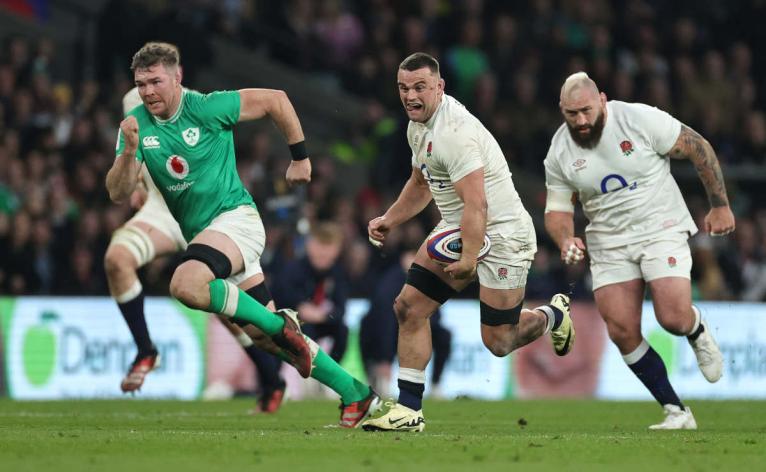
As a South African, Habana thinks more patriotically and pragmatically, and he turns to a man with a proven record of tearing it up on the SVNS circuit.
“I’m going to be biased and, because the Blitzboks aren’t going as well as they should be, I’d be very keen to call on the likes of Cheslin Kolbe to come back. He has the experience of two World Cup medals, he’s been playing in Japan which means his body’s probably not too pushed, and he was previously an absolute superstar in sevens. His experience among what is quite a young group of players would mean a lot.”
And with that the Habana smile is back in place – all memories of his own private sevens hell wiped away, and now all anticipation at the countdown to Paris 2024 and the inevitable plot twists along the way.



Comments
Join free and tell us what you really think!
Sign up for free